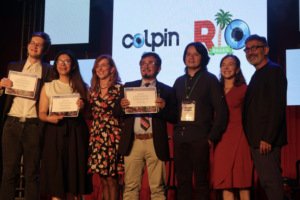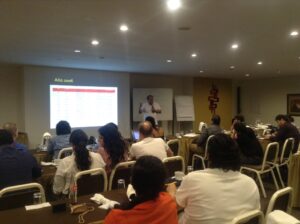Feature stories on the relationship between the housing boom and water shortages in Mexico City, problems plaguing the Gran Misión Vivienda social program in Caracas and the Minha Casa Minha Vida housing program in Brazil might never have seen the light of day without the support of the Lincoln Institute of Land Policy.
The Lincoln Institute of Land Policy is a private, non-profit foundation based in the United States that seeks to improve the quality of life through the effective use, taxation and management of land. For a couple of decades, a partnership with journalism has been part of its mission.
"We know that journalists are important allies in our mission, as they are the ones who can communicate the issues we work on to broader audiences," said Laura Mullahy, Lincoln Institute special projects manager.
Ten years ago, the Institute began to support journalists in Latin America through training courses, both face-to-face and remote. In 2022, they also decided to create an award for coverage of urban issues that is bestowed in the context of the Latin American Conference of Investigative Journalism (COLPIN, by its Spanish acronym).
"It’s been a gradual and constant work to try to open space in the region. We understand that land policies are not the most accessible or 'friendly' topic. And we know that even for journalists who are interested in these issues, it’s often difficult for them to get their news outlets to approve stories on them. We've heard this from many journalists in our courses," Mullahy said.
However, according to her, there has been a gradual but positive trend in terms of interest in city issues and a growing presence of urban issues in Latin American media.

Winners of the first edition of the 'Lincoln Prize for Journalism on Urban Policies, Sustainable Development and Climate Change' during the Latin American Investigative Journalism Conference in 2022. (Photo: Instituto Prensa y Sociedad)
So much so that the first edition of the "Lincoln Prize for Journalism on Urban Policies, Sustainable Development and Climate Change" received 160 feature stories from 19 countries and 46 cities.
"We have seen stories on topics that were previously difficult to imagine being published in the media. For the 2022 Lincoln Award, the year we launched it, the second prize went to a collection of 86 stories on the Land Use Plan (POT) of the city of Bogota. It was an analysis of this planning tool and the process of its application from many perspectives, which could be of use to other cities," Mullahy said.
The first prize went to Alejandro Melgoza Rocha for his story Tulúm: An illegal paradise, published by N+ Focus (Mexico). The work deals with the razing of dunes, mangroves, reefs and jungle in Tulum, Quintana Roo, Mexico, by businessmen, public officials and municipal authorities, which compromises the environment in the search of a piece of land to exploit.
This year, the award will hold its second edition and applications will be accepted until Sept. 10, 2023. Entries are invited on topics such as how efficient and equitable tax systems work; initiatives that promote access to resources and opportunities; access to basic public services; innovative initiatives and projects to promote conservation policies; and prevention of the most catastrophic effects of climate change through land use policies.
The Lincoln Institute of Land Policy estimates that through its traditional classroom and distance learning training courses, it has been able to impact more than 20,000 people. And for the courses focused on journalists, an average of 300 professionals have participated.

Course on land policy and investigative journalism in Lima, in 2016. Organized by the Instituto Prensa y Sociedad and the Lincoln Institute (Photo: Lisseth Boon).
"The Lincoln Institute has sought to be present at key moments, such as changes in authority figures, passage of new legislation, or other turning points. We know that our presence can make a difference," Mullahy said. "Indeed, we see many changes and trends in Latin America related to progress of the development and implementation of land management instruments and related legislation, in which Lincoln courses and their students have had an influence and, in some cases, an active role."
The Lincoln Institute not only has training courses or this award, it also grows its community through printed publications and multimedia materials, research support, networking and partnerships with other institutions.
They have created a community of professionals throughout Latin America who define themselves as carriers of the "Lincoln chip."
The Lincoln Institute also launched the Estación Ciudad [City station] project, a podcast on urban stories in Latin America that, according to its website, seeks to reflect on the dynamics regarding land, housing and resources in our cities.
"We know that living in cities that are more just, equitable and capable of responding to the climate challenges of our time is possible, and that the first step to achieving this is to understand the processes that shape the cities we live in," explained its creators.
"We seek to bring the concepts of urbanism closer to the real experience of people to initiate an accessible, interdisciplinary and inclusive dialogue that can contribute to the transformation of our cities."